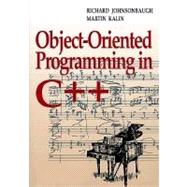
RICHARD JOHNSONBAUGH is professor of computer science at DePaul University. He has degrees in computer science and mathematics from the University of Oregon, Yale University, and the University of Illinois at Chicago. He is the author of Discrete Mathematics, Fourth Edition, and the co-author with Martin Kalin of C for Scientists and Engineers, Applications Programming in C++, Applications Programming in ANSI C, Third Edition, and Object-Oriented Programming in C++.
MARTIN KALIN is also professor of computer science at DePaul University. He has a Ph.D. degree in logic from Northwestern University. His research areas include data communications and programming languages. He has written large systems in the areas of scheduling and product configuration for Fortune 100 companies.
|
1 | (20) | |||
|
21 | (77) | |||
|
98 | (77) | |||
|
175 | (54) | |||
|
229 | (56) | |||
|
285 | (55) | |||
|
340 | (62) | |||
|
402 | (77) | |||
|
479 | (48) | |||
| A ASCII Table | 527 | (4) | |||
| B Selected C++ Functions And Methods | 531 | (43) | |||
| Hints And Solutions To Odd-Numbered Exercises | 574 | (27) | |||
| Index | 601 |
The New copy of this book will include any supplemental materials advertised. Please check the title of the book to determine if it should include any access cards, study guides, lab manuals, CDs, etc.
The Used, Rental and eBook copies of this book are not guaranteed to include any supplemental materials. Typically, only the book itself is included. This is true even if the title states it includes any access cards, study guides, lab manuals, CDs, etc.